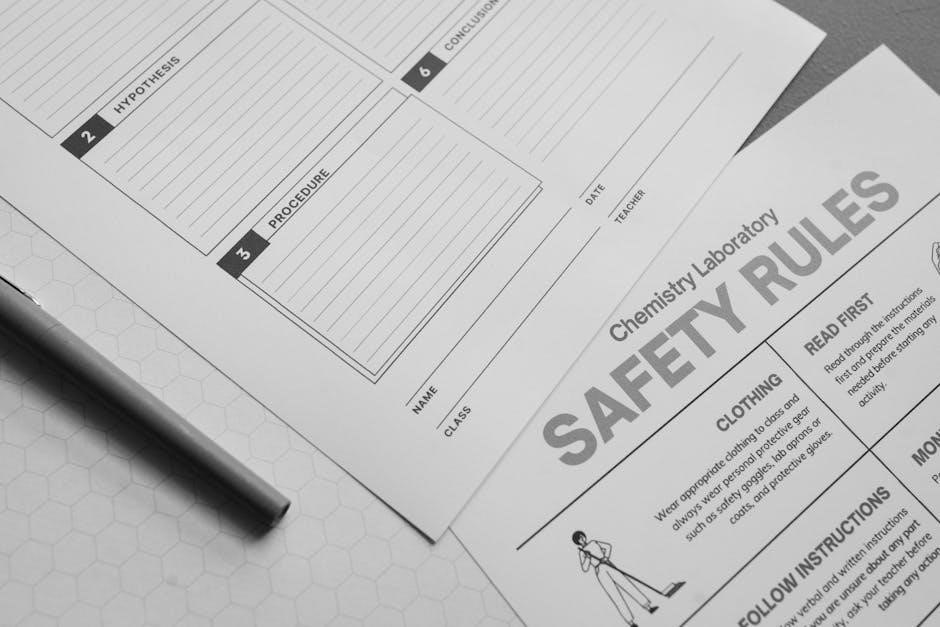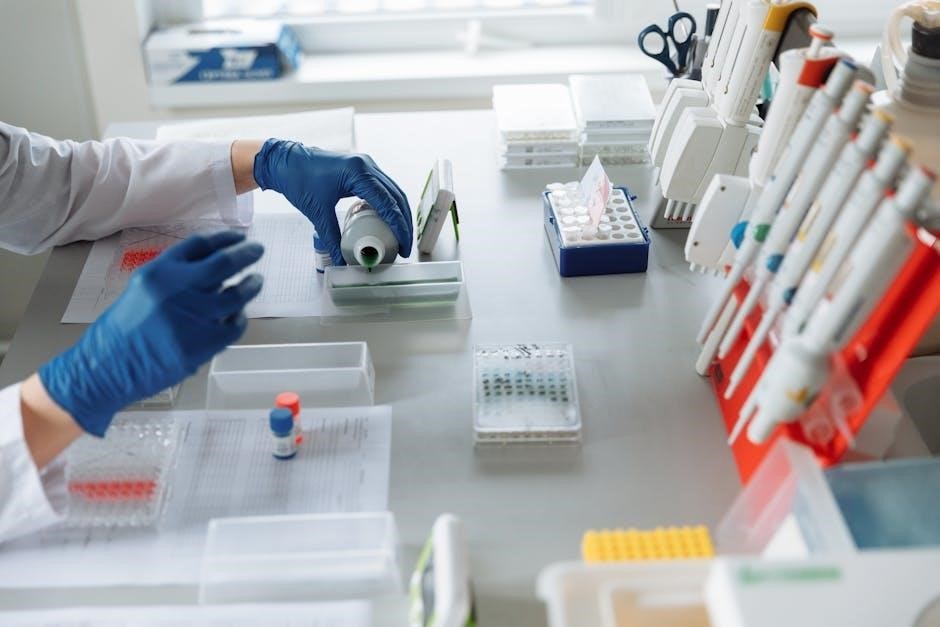general chemistry study guide acs pdf

The ACS General Chemistry Exam is a standardized test assessing core chemistry concepts. Administered by the American Chemical Society, it features 75 multiple-choice questions in 110 minutes, evaluating understanding of atomic structure, bonding, and key principles. Effective preparation is crucial for achieving a high score.
Importance of the ACS Exam
The ACS General Chemistry Exam is a critical assessment for students pursuing chemistry and related fields. It evaluates mastery of fundamental concepts, ensuring readiness for advanced studies. High scores enhance academic and professional opportunities, demonstrating a strong foundation in chemistry. The exam also serves as a benchmark for universities to gauge program effectiveness. Its standardized format ensures fairness and consistency nationwide. Moreover, it helps identify areas where students may need additional review, fostering improved learning outcomes. The exam’s challenging nature prepares students for the rigors of scientific careers. Additionally, it plays a role in retaining diverse talent in STEM, as highlighted by its impact on underrepresented groups. Thus, the ACS Exam is not just a test but a pivotal step in shaping future chemists and scientists.
Brief Overview of the Study Guide
The ACS General Chemistry Study Guide is a comprehensive resource designed to help students prepare for the ACS exam. It covers essential topics such as atomic structure, chemical bonding, thermodynamics, and kinetics. The guide includes practice questions, sample answers, and strategies for tackling multiple-choice formats; Available in PDF format, it provides a structured approach to understanding key concepts and improving problem-solving skills. The study guide is often referred to as Preparing for Your ACS Examination in General Chemistry and is widely recognized as an official resource for exam preparation. With 201 practice questions and detailed explanations, it helps students identify weaknesses and improve their understanding of general chemistry principles. While it is an invaluable tool, it is not exhaustive, and students are encouraged to supplement it with additional study materials for a well-rounded preparation strategy.

Exam Structure and Format
The ACS General Chemistry Exam includes 75 multiple-choice questions, lasting 110 minutes. It assesses understanding of core concepts like atomic structure, bonding, and thermodynamics, requiring strategic time management and focus.
Multiple-Choice Questions
The ACS General Chemistry Exam consists of 75 multiple-choice questions designed to assess a student’s understanding of fundamental chemistry concepts. These questions cover a wide range of topics, including atomic structure, chemical bonding, thermodynamics, and kinetics. Each question provides four or five options, with only one correct answer. Students are allotted 110 minutes to complete the exam, requiring effective time management to answer all questions thoroughly. The multiple-choice format demands strong analytical skills, as students must often eliminate incorrect options before selecting the best answer. Practice exams and study guides are invaluable for familiarizing oneself with the question style and improving problem-solving speed. Additionally, the exam emphasizes the ability to apply theoretical knowledge to practical scenarios, making it essential to grasp key concepts rather than just memorizing facts. Regular practice with sample questions is highly recommended to build confidence and accuracy. By mastering these strategies, students can approach the exam with confidence and achieve their desired results.
Time Management Strategies
Effective time management is crucial for success on the ACS General Chemistry Exam. With 75 multiple-choice questions and a 110-minute time limit, students must allocate their time wisely. A suggested strategy is to skim through the entire exam first to identify easier questions and tackle them immediately, ensuring no points are left on the table. Allocate approximately 1.5 minutes per question, leaving extra time for challenging problems. Prioritize questions covering high-weight topics like thermodynamics or chemical bonding, as they often appear more frequently. Avoid spending more than 3 minutes on a single question, as this can disrupt the overall pace. Use the process of elimination to narrow down answers and make educated guesses when necessary. Finally, budget 5-10 minutes at the end to review answers and ensure all questions are attempted. Staying calm and adhering to a time plan can significantly improve performance and reduce anxiety during the exam. Proper preparation and practice with timed mock exams are essential for mastering this skill.
Scoring System and Grading
The ACS General Chemistry Exam uses a scoring system based on the number of correct answers. The exam consists of 75 multiple-choice questions, and each correct answer contributes to the raw score. There is no negative marking for incorrect or unanswered questions. The raw score is then converted to a scaled score, ensuring consistency across different exam administrations. Scaled scores range from 0 to 100, with higher scores indicating better performance. A score of 50 represents average performance, while scores above 70 are considered exceptional. The grading system is designed to reflect a student’s mastery of general chemistry concepts. To pass, students typically need a score of 60 or higher, though specific cutoffs may vary. Understanding the scoring system helps students set realistic goals and focus their study efforts effectively. Regular practice with sample questions can improve accuracy and time management, leading to higher scores.

Study Strategies for Success
Utilize practice exams to identify weaknesses and refine problem-solving skills. Engage in active learning by solving problems and reviewing concepts regularly. Stay motivated and maintain a consistent study schedule for optimal preparation.
Active Learning Techniques
Active learning techniques are essential for mastering the ACS General Chemistry Exam. Engage with material through group discussions, problem-solving sessions, and hands-on activities. Use think-pair-share to clarify doubts and explain concepts to peers. Self-quizzing and flashcards help reinforce key terms and reactions. Teaching others forces deeper understanding and retention. Incorporate real-world applications to connect theory with practical scenarios. Regularly review and summarize notes in your own words to identify gaps. Practice drawing structures, mechanisms, and graphs to visualize complex concepts. Utilize digital tools like interactive simulations to explore molecular structures and reactions dynamically. Active recall, such as solving practice problems without notes, strengthens long-term memory. These methods ensure you remain proactive and engaged, enhancing your ability to apply knowledge during the exam. Consistent practice and active participation in learning activities are critical for success in the ACS General Chemistry Exam.
Effective Note-Taking Methods
Effective note-taking is a cornerstone of success in preparing for the ACS General Chemistry Exam. It involves capturing key concepts, equations, and definitions in a clear and organized manner. Use bullet points or mind maps to break down complex topics like atomic structure or chemical bonding. Review and organize notes promptly after class or study sessions to ensure retention. Prioritize understanding over memorization by summarizing information in your own words. Highlight or underline critical formulas and theories to emphasize their importance. Avoid clutter by focusing on main ideas rather than copying entire texts. Active engagement with notes, such as self-quizzing or creating concept charts, enhances learning. Regularly reviewing notes helps identify gaps in knowledge, allowing for timely clarification. By maintaining a structured and concise note-taking system, students can efficiently master the material covered in the ACS study guide, ensuring they are well-prepared for the exam.
Utilizing Practice Exams Wisely
Practice exams are essential for effective preparation for the ACS General Chemistry Exam. They simulate real test conditions, helping students assess their readiness and identify weak areas. Start by taking timed practice exams to refine time management skills. Focus on understanding the question format, such as multiple-choice questions, and familiarize yourself with the content distribution. After completing a practice exam, thoroughly review the answers, paying special attention to mistakes. Analyze the underlying concepts and re-study the relevant sections. Use the practice exams to track progress over time, ensuring steady improvement. Additionally, review the official study guide and supplementary materials to reinforce learning. Regular practice helps build confidence and reduces test anxiety. By systematically addressing weaknesses and honing problem-solving skills, students can maximize their performance on exam day. Consistent use of practice exams is a proven strategy for achieving success in the ACS General Chemistry Exam.
Key Topics Covered in the Study Guide
The study guide covers essential topics like atomic structure, periodicity, chemical bonding, molecular structure, thermodynamics, and kinetics. These areas form the foundation of general chemistry and are critical for exam success.
Atomic Structure and Periodicity
Atomic structure and periodicity are foundational concepts in general chemistry, essential for understanding the behavior of elements. The atomic structure involves the arrangement of protons, neutrons, and electrons, with a focus on electron configurations and periodic trends. The periodic table organizes elements based on atomic number and recurring chemical properties. Key trends include atomic radius, ionization energy, and electronegativity, which decrease or increase across periods and groups. Mastery of these concepts is critical for predicting chemical behavior and bonding patterns. The ACS exam emphasizes understanding periodic relationships and their applications in chemical reactions and molecular interactions. Students should focus on memorizing the periodic table, practicing electron configurations, and analyzing trends to excel in this section. These skills form the basis for advanced topics like chemical bonding and thermodynamics, making atomic structure and periodicity a cornerstone of the ACS General Chemistry Exam preparation.
Chemical Bonding and Molecular Structure
Chemical bonding and molecular structure are fundamental concepts in general chemistry, essential for understanding how atoms interact and form molecules. This section of the study guide delves into the principles of ionic, covalent, and metallic bonds, explaining their formation and properties. Students learn about Lewis structures, molecular geometry, and the VSEPR theory, which predicts the shapes of molecules based on electron pair repulsions. The guide also explores intermolecular forces, such as hydrogen bonding, dipole-dipole interactions, and van der Waals forces, which influence physical properties like boiling and melting points. Additionally, the study material covers periodic trends, including electronegativity and bond strength, to help students analyze and predict chemical behavior. Mastering these concepts is critical for solving problems related to molecular stability, reactivity, and the physical properties of substances, all of which are heavily tested on the ACS General Chemistry Exam;
Thermodynamics and Kinetics
Thermodynamics and kinetics are fundamental concepts in general chemistry, focusing on energy changes and reaction rates. Thermodynamics explores the relationships between heat, work, and energy, including laws governing energy conservation and entropy. Key topics include calculating enthalpy changes, understanding Gibbs free energy, and predicting spontaneity of reactions. Kinetics, on the other hand, examines the rates of chemical reactions, factors influencing them, and mechanisms by which reactions proceed. Students must master concepts like activation energy, catalysts, and rate laws. Both areas require problem-solving skills, such as interpreting graphs of concentration vs; time and calculating equilibrium constants. The ACS study guide provides practice problems and examples to help students grasp these principles, ensuring they can apply them to complex scenarios during the exam. These topics are critical for understanding how chemical systems behave and evolve over time.

Practice Exams and Resources
Utilize official ACS practice exams to familiarize yourself with the format and content. Additional resources, such as the General Chemistry Study Guide, provide sample questions and detailed solutions for effective preparation.
Sample Questions and Answers
Sample questions and answers in the ACS General Chemistry Study Guide provide students with practical examples to assess their understanding of key concepts. These questions cover topics such as atomic structure, chemical bonding, and thermodynamics, mirroring the actual exam format. For instance, a question might ask:
“Which of the following statements about ionic compounds is correct?”
A) They exhibit high vapor pressure.
B) They are good conductors of electricity in aqueous solutions.
C) They have low melting points.
D) They are typically soluble in nonpolar solvents.
The correct answer is B, as ionic compounds conduct electricity when dissolved in water. Such examples help students identify areas needing review. Additionally, detailed explanations accompany each answer, reinforcing learning and problem-solving strategies. Regular practice with these questions enhances familiarity with the exam’s structure and content, boosting confidence and readiness.
Where to Find Additional Practice Materials
Additional practice materials for the ACS General Chemistry Exam can be found through various resources. The official American Chemical Society (ACS) website offers study guides and practice exams, such as the General Chemistry Study Guide, which includes sample questions and answers. Universities like the University of Pittsburgh provide practice exam documents that cover essential topics like atomic structure and chemical bonding. Online platforms and educational websites also offer PDF resources and practice questions specifically designed for the ACS exam. Furthermore, libraries and academic institutions often have access to COUNTER-compliant article downloads and study materials. Utilizing these resources ensures a comprehensive preparation for the exam, helping students familiarize themselves with the format and content. These materials are invaluable for simulating exam conditions and improving problem-solving skills.
Analyzing Mistakes for Improvement
Analyzing mistakes is a critical step in improving performance on the ACS General Chemistry Exam. Identify error patterns by reviewing incorrect answers in practice exams. Understand the root cause of each mistake, whether due to conceptual misunderstandings or calculation errors. Focus on weak areas to strengthen knowledge gaps; Use the study guide to clarify doubts and reinforce learning. Tracking progress over time helps measure improvement and builds confidence. Mistakes are valuable learning opportunities, enabling a more focused and effective study approach. Regularly reviewing and addressing errors ensures long-term retention of key concepts. This reflective process is essential for achieving success in the exam and beyond. By learning from mistakes, students can refine their problem-solving skills and develop a deeper understanding of general chemistry principles. This systematic approach fosters resilience and prepares learners for the challenges of the ACS exam.

Common Challenges and Solutions
Students often struggle with chemical equations, time management, and test anxiety. Solutions include practicing equations regularly, using timers during practice, and employing stress-reduction techniques to stay focused during exams.
Difficulty with Chemical Equations
Many students struggle with balancing chemical equations, a fundamental skill for the ACS General Chemistry Exam. Practice is key to mastering this process. Start by identifying the number of atoms for each element on both sides of the equation. Use coefficients (small numbers in front of formulas) rather than subscripts to balance atoms. For ions and polyatomic ions, ensure their charges are considered. Common mistakes include forgetting to balance all elements or misplacing coefficients. Regular practice with sample questions helps build confidence. Additionally, understanding the types of chemical reactions (e.g., synthesis, decomposition) can simplify the process. Utilize the study guide’s practice exams to refine your skills and seek clarification from instructors when challenges arise;
Managing Time Effectively During the Exam
Time management is critical for success on the ACS General Chemistry Exam, which includes 75 multiple-choice questions to be completed in 110 minutes. To avoid running out of time, allocate approximately 1.5 minutes per question. Start by skimming through the exam to identify easier questions and tackle them first, marking difficult ones for later. Allocate 5-10 minutes at the end to review unanswered questions. Avoid spending too much time on a single question, as this can jeopardize your ability to complete the entire exam. Practice exams are invaluable for refining your pacing and ensuring you can work efficiently under pressure. Staying calm and focused will help you maximize your performance. By prioritizing questions and maintaining a steady pace, you can effectively manage your time and achieve a strong score.
Overcoming Test Anxiety
Test anxiety is a common challenge for students preparing for the ACS General Chemistry Exam. To manage this, it’s essential to adopt a structured approach to studying and practice relaxation techniques. Start by familiarizing yourself with the exam format and content through the official study guide and practice exams. Breaking study sessions into manageable chunks and focusing on understanding concepts rather than memorization can reduce stress. Additionally, time management during the exam is crucial—allocate a set amount of time per question to avoid feeling overwhelmed. Techniques such as deep breathing, mindfulness, or short breaks during studying can help maintain a calm mindset. Building confidence through consistent practice and identifying areas for improvement can also alleviate anxiety. Remember, preparation is key, and staying positive can significantly impact performance. By addressing anxiety proactively, students can approach the exam with confidence and focus;

Additional Tips for Success
Join study groups to collaborate and discuss challenging topics. Seek guidance from instructors to clarify doubts. Maintain a consistent study schedule and stay motivated to achieve exam success effectively.
Benefits of Study Groups
Study groups offer significant advantages for students preparing for the ACS General Chemistry Exam. Collaborative learning fosters active engagement, enabling participants to discuss complex topics and clarify doubts collectively. Peer teaching enhances understanding, as explaining concepts to others reinforces one’s own knowledge. Group discussions also expose students to diverse problem-solving strategies, broadening their approach to challenging questions. Additionally, study groups promote accountability, as members motivate each other to stay on track with study schedules. Regular meetings ensure consistent progress, helping students cover the exam’s extensive content systematically. Furthermore, group study sessions provide emotional support, reducing stress and isolation during intense preparation. By pooling resources, students can share practice materials, including the general chemistry study guide ACS PDF, and work through practice exams together. This collaborative environment not only improves retention but also builds confidence, equipping students to tackle the exam more effectively. Ultimately, study groups create a dynamic and supportive learning atmosphere that complements individual study efforts.
Seeking Help from Instructors
Seeking help from instructors is a vital strategy for success in preparing for the ACS General Chemistry Exam. Instructors can provide personalized guidance, clarify complex concepts, and address specific areas of difficulty. They often have extensive experience with the exam format and can offer tailored advice. Regular interaction with instructors helps students stay on track with their study plan and ensures they understand key topics covered in the study guide. Additionally, instructors can recommend supplementary resources, such as practice problems or review materials, to reinforce learning. Don’t hesitate to ask questions during office hours or after class—clarifying doubts early can prevent confusion later. By leveraging their instructors’ expertise, students can gain a deeper understanding of the material and improve their performance on the exam. This proactive approach not only boosts confidence but also enhances overall mastery of general chemistry concepts.
Staying Motivated and Focused
Staying motivated and focused is essential for success in preparing for the ACS General Chemistry Exam. Set clear, achievable goals to maintain direction and track progress. Breaking study sessions into manageable chunks can prevent burnout and enhance retention. A quiet, organized study environment free from distractions is crucial for concentration. Rewarding oneself after completing challenging tasks can boost motivation. Regular breaks and mindfulness practices help maintain mental clarity. Surrounding oneself with supportive peers or joining study groups fosters accountability and shared learning. Celebrating small victories reinforces a positive mindset. Reminding oneself of the importance of the exam and its impact on future opportunities can reignite determination. Staying organized with a structured study plan ensures consistent effort. Embracing challenges as learning opportunities rather than obstacles builds resilience. By maintaining a balanced routine and prioritizing self-care, students can sustain focus and motivation throughout their preparation journey.

Understanding the Study Guide
The study guide provides comprehensive resources, including practice exams and detailed explanations, to help students master general chemistry concepts effectively for the ACS exam.
Effective Use of the Study Guide
Maximizing the ACS General Chemistry Study Guide involves a structured approach to ensure comprehensive preparation. Begin by reviewing the guide’s content, focusing on key topics such as atomic structure, chemical bonding, and thermodynamics. Practice exams within the guide provide valuable insights into the exam format and difficulty level. Start with timed practice sessions to simulate real-test conditions, helping you refine time management skills. After completing each practice exam, thoroughly analyze your mistakes to identify areas needing improvement. The official guide also includes detailed explanations for correct answers, which can clarify concepts and strengthen your understanding. Regularly review notes and summaries to reinforce learning. Additionally, the guide’s PDF format allows for easy navigation and accessibility, enabling you to study efficiently. By systematically using the study guide, you can build confidence and readiness for the ACS exam. Stay motivated and consistent in your preparation to achieve success.
Navigating the PDF Format
Navigating the PDF format of the ACS General Chemistry Study Guide involves utilizing built-in features to enhance efficiency. Bookmarking key sections like thermodynamics and kinetics allows quick access. Hyperlinks may connect to additional resources or cross-references, aiding deeper exploration. The search function enables rapid location of specific topics, such as molecular structure, saving time. Annotation tools permit highlighting and note-taking, fostering active learning. However, some PDFs may restrict editing, requiring specific software. The guide’s layout should be device-friendly, ensuring readability on tablets and smartphones for flexible study. Embedded practice questions or links to external resources can enrich the learning experience. Overall, leveraging these features optimizes study sessions, though specific functionalities depend on the PDF’s setup by the American Chemical Society.
Leave a Reply
You must be logged in to post a comment.